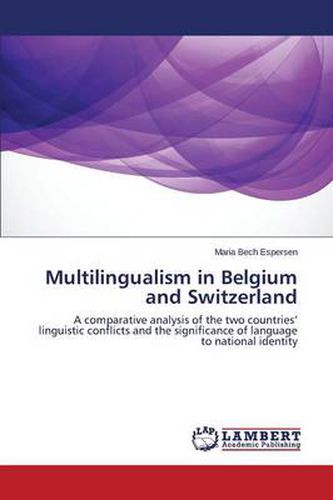Readings Newsletter
Become a Readings Member to make your shopping experience even easier.
Sign in or sign up for free!
You’re not far away from qualifying for FREE standard shipping within Australia
You’ve qualified for FREE standard shipping within Australia
The cart is loading…






This title is printed to order. This book may have been self-published. If so, we cannot guarantee the quality of the content. In the main most books will have gone through the editing process however some may not. We therefore suggest that you be aware of this before ordering this book. If in doubt check either the author or publisher’s details as we are unable to accept any returns unless they are faulty. Please contact us if you have any questions.
Belgium and Switzerland are two very interesting multilingual countries to compare. Both countries have more than two official languages, both have official language policies and both are federal states. But that is also how far it goes with the similarities. In the case of Belgium, the Belgians have experienced many problems and conflicts regarding the cooperation, or lack of, between the different language communities. Especially the two regions Flanders and Wallonia have big problems with working together, which is caused by issues rooted deeply in the Belgian history. In Switzerland, however, the situation is very different: the four official languages never had any obvious conflicts with each other. Still, multilingualism in Switzerland is a hotly debated topic at the moment as the increasing role of English as lingua franca in Switzerland has a kick-started a discussion about the importance of learning the Swiss national languages compared to the importance of learning English. This book analyses the linguistic conflicts and the approaches to multilingualism, national identity and language policies of the two countries.
$9.00 standard shipping within Australia
FREE standard shipping within Australia for orders over $100.00
Express & International shipping calculated at checkout
This title is printed to order. This book may have been self-published. If so, we cannot guarantee the quality of the content. In the main most books will have gone through the editing process however some may not. We therefore suggest that you be aware of this before ordering this book. If in doubt check either the author or publisher’s details as we are unable to accept any returns unless they are faulty. Please contact us if you have any questions.
Belgium and Switzerland are two very interesting multilingual countries to compare. Both countries have more than two official languages, both have official language policies and both are federal states. But that is also how far it goes with the similarities. In the case of Belgium, the Belgians have experienced many problems and conflicts regarding the cooperation, or lack of, between the different language communities. Especially the two regions Flanders and Wallonia have big problems with working together, which is caused by issues rooted deeply in the Belgian history. In Switzerland, however, the situation is very different: the four official languages never had any obvious conflicts with each other. Still, multilingualism in Switzerland is a hotly debated topic at the moment as the increasing role of English as lingua franca in Switzerland has a kick-started a discussion about the importance of learning the Swiss national languages compared to the importance of learning English. This book analyses the linguistic conflicts and the approaches to multilingualism, national identity and language policies of the two countries.